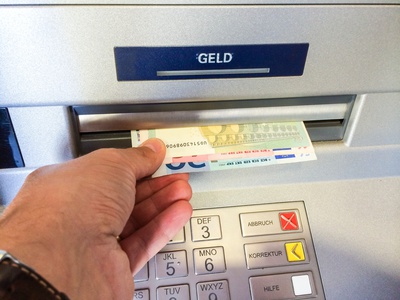Staying Safe at the ATM: Avoiding Card Skimming

Check out our Great Tips on Staying Safe at the ATM and Avoiding Card Skimming
If you use ATM machines, you’re at risk for card skimming. 33% of all debit card fraud incidents have been linked to card skimming, with over $2 billion in losses at ATMs around the world. Card skimming is the practice of thieves stealing personal information from your bank card and it can take place in the form of hidden cameras, altered card readers, or the fraudsters themselves causing a diversion at the ATM. The following tips can help keep yourself and your identity information safe by avoiding card skimming.
Avoid ATMs on street corners, dark and remote places, and where people are loitering instead of conducting banking transactions.
Non-credit union ATMs are at particularly high risk for theft. While no ATM may ever be 100% safeguarded from fraud, credit unions and banks are much safer places to use a bank card than the standalone ATMs literally anyone on the street can access. Also credit unions usually have closed-in ATM areas with 24-hour cameras, and busy branches may also have live security guards during business hours.
If you see people who are hanging around an ATM instead of using it, avoid the area and use an ATM elsewhere.
Be on the lookout for suspiciously altered ATMs and electronics.
If the card reader looks altered or any parts look loose, don’t use the ATM and report it to the police and to bank or credit union personnel if that was one of their ATMs. Report any phones suspiciously laying around the area, you won’t know if a customer left it by accident or if it’s a card skimming effort recording people’s card numbers and PINs.
Keep your bank card and PIN keying out of sight.
Fraudsters and their accomplices will often try to cause a diversion in order to steal people’s cash and/or bank card information. If someone says there is a problem with an ATM, don’t go near it or try to assist them as it’s likely a scammer. Keep your bank card hidden.
Even if there is no one around, card skimmers can still leave devices that record card numbers and PINs. Keep your hand hovered over the card slot and keypad to keep your card number as well as PIN keying concealed and do not give anyone your PIN number. Do not write it down anywhere where people can easily find it in your wallet, purse, or other belongings.
Stay alert and do not get distracted while at the ATM.
Distracted people frequently get targeted for robbery at ATMs. Avoid wearing headphones, talking on the phone, texting, or other distracting activities that could easily open you up to having your information stolen. Be aware of your surroundings and look for suspicious people as well as machines or devices that seem out of place. All of these tips are helpful to avoiding card skimming.
Plan out your transactions in advance as distracted lingering at an ATM can also leave you vulnerable to card skimming or robbery. Immediately take your cash, card, and receipt when you’ve concluded your transaction and do not leave anything behind.
Keep track of your account balances.
Check your credit union balance daily and see if any unauthorized transactions come up. Non-credit union ATMs present the most risk for card skimming, but your hard-earned cash can still be stolen by even the most devious fraudster right on the premises. Immediately report any transactions you did not engage in and if need be, cancel your card and have a new one issued so the scammer can’t keep using the same numbers. Change your PIN as well.
Source
http://ccuassociation.org/compliance/compliance-toolkits/atm-skimming-toolkit
http://www.atmmarketplace.com/articles/atm-card-skimming-in-2015-crime-waves-countermeasures-and-case-studies/
https://www.fbi.gov/news/stories/2011/july/atm_071411
https://www.fbi.gov/philadelphia/press-releases/2015/fbi-seeks-public-assistance-to-locate-atm-skimming-suspects
Return to Blog